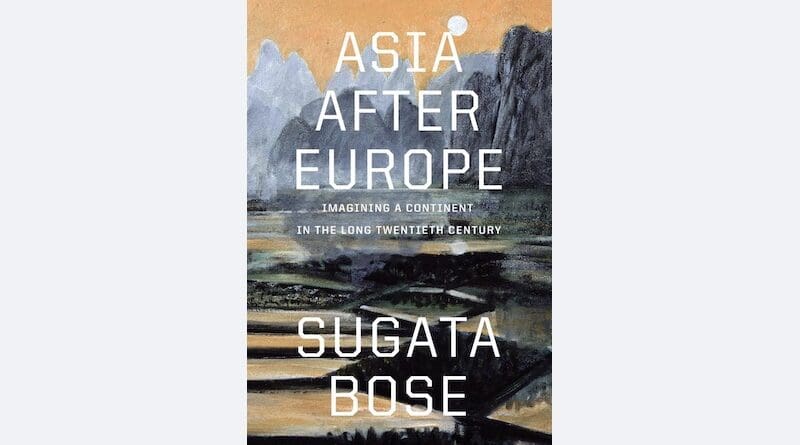Bold New History Of Asian Identity – Book Review
Rarely would one read a history of thought and one of an evolving continental identity as exciting as Sugato Bose’s “Asia after Europe: Imagining a Continent in the Long Twentieth Century”. The book is a wonderful “concise new history” of a century of struggles to define Asian identity and express alternatives to European forms of universalism. But the real appeal of the book is that it encompasses many pointers to the future, the most important being you cannot imagine Asia differently from the West until you break free of the shackles of European colonial era map making.
The shift of global power balance that raises hope of an ‘Asian Century’ in our time has always demanded rigorous examination of what constitutes an Asian identity and a closer look at efforts to define it over centuries of servitude during the long phase of European colonial subjugation of the ancient Continent.
Fellow Bengali Nobel laureate Amartya Sen is right in describing the book as a “brilliant history of continental connections which offers vital lessons for Asia’s shared future.”
The balance of global power has changed profoundly over the course of the twentieth century, above all with the economic and political rise of Asia. “Asia after Europe” is a bold new interpretation of the period, focusing on the conflicting and overlapping ways in which Asians have conceived their bonds and their roles in the world.
Tracking the circulation of ideas and people across colonial and national borders, Sugata Bose explores developments in Asian thought, art, and politics that defied Euro-American models and defined Asianness as a locus of solidarity for all humanity.
Impressive in scale, yet driven by the stories of fascinating and influential individuals, “Asia after Europe” examines early intimations of Asian solidarity and universalism preceding Japan’s victory over Russia in 1905; the revolutionary collaborations of the First World War and its aftermath, when Asian universalism took shape alongside Wilsonian internationalism and Bolshevism; the impact of the Great Depression and Second World War on the idea of Asia; and the persistence of forms of Asian universalism in the postwar period, despite the consolidation of postcolonial nation-states on a European model.
Bose takes an intimate look at diverse Asian universalisms were forged and fractured through phases of poverty and prosperity, among elites and common people, throughout the span of the twentieth century. Noting the endurance of nationalist rivalries, often tied to religious exclusion and violence, Bose concludes with reflections on the continuing potential of political thought beyond European definitions of reason, nation, and identity.
Across the twentieth century, Asians have been coming up with universalist ideals centered on the idea of Asia itself, rivaling European colonial thought, liberalism, and race-based nationalisms. Sugata Bose explores the history of Asian universalisms and reflects on their potential amid ongoing nationalist rivalries tied to religious majoritarianism and violence.
Rarely has one found “a trenchant, capacious and moving feast of historical interpretation” as readable as a captivating thriller. Truth and history can be stranger than fiction but Bose has made his history of Imagining Asia more exciting — and eminently readable- than many great works of contemporary fiction.
“In this enthralling intellectual history of a continent, Bose breaks out of European referents to focus on the mobility of Asian people, ideas, and imaginaries. A pathbreaking foray into the making of modern Asia,” says Seema Alavi of Ashoka University.
Observes Wang Gungwu of the National University of Singapore: “This is a deeply felt and carefully argued book. Sugata Bose captures the hopes and misjudgments of generations of Asian thinkers. He makes us wonder if the US-led international system based on sovereign nation-states and the new nationalisms that this system produced might have lured Asia too far for its alternative forms of universalism to succeed.”
Sugata Bose, the Gardiner Professor of Oceanic History and Affairs at Harvard University, is the author of “His Majesty’s Opponent: Subhas Chandra Bose and India’s Struggle against Empire” and “A Hundred Horizons: The Indian Ocean in the Age of Global Empire”.
In addition, he is grandson of India’s independence war hero “Netaji” Subhas Chandra Bose, who alongwith fellow Bengali and Asia’s first Nobel Laureate Rabindranath Tagore, subscribed to the idea of a distinct Asian identity. Sugato Bose draws on Tagore’s voyages across Asia in the years after he was awarded the Nobel for Literature and his grand interactions with the Japanese Okakura and China’s Lian Qichao and Kang Youwei to portray the evolution of a modern Asian thoughtzone.
After Pankaj Mishra’s “From The Ruins of Empire,” one has not come across as comprehensive a survey of the evolving Asiatic thought zone in the era of colonial rule as Bose’s “Asia after Europe”.
“My decision to write this book stemmed from the conviction that the phenomenon described as the rise of Asia had to be placed in proper historical perspective. It is a history of Asia as a connected space not only after the European colonial presence, but also a conceptual history of universalism and cosmopolitanism that moves beyond European definitions of reason, national identity, and federation. Asia stands today at the end of an era as alternative futures beckon. This book offers my interpretation of the changing balance of global power during the long twentieth century between Asia and Euro-America by painting a portrait of an age,” says Prof. Bose.

